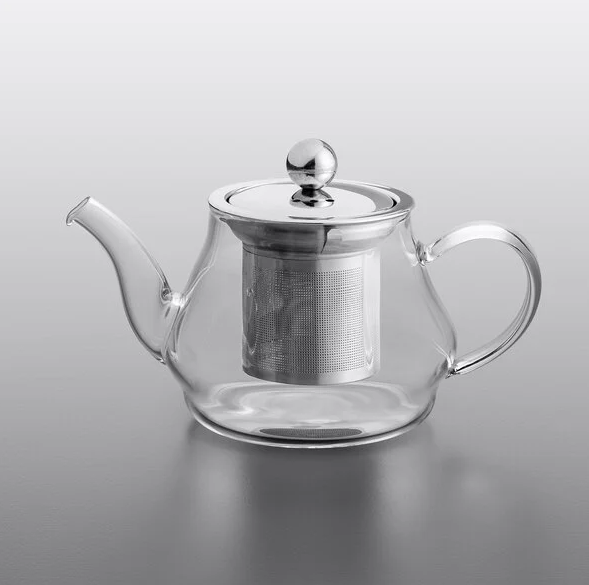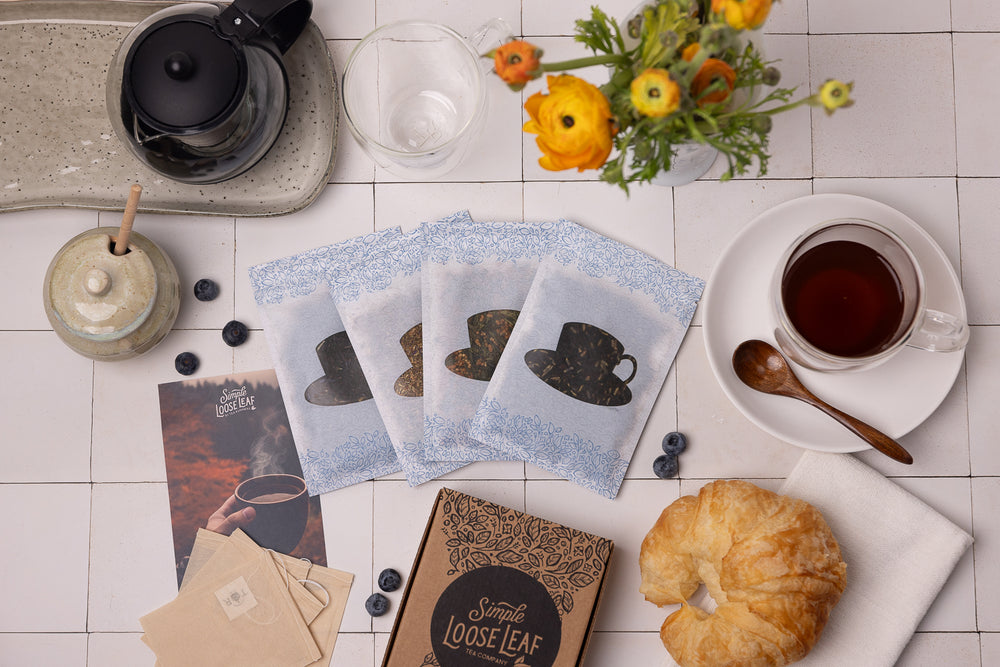How Jasmine Tea Benefits Health & Weight Loss
Fragrant, romantic and irresistible, Jasmine flowers are one of the best flowers for scenting tea. This “Queen of Flowers” does not only attract butterflies, but many tea drinkers too. These fragrant white blossoms are a national flower of many countries—from Indonesia and Philippines, to Paraguay, Cuba, Pakistan, Syria and Tunisia. Jasmine is mostly used as tea, essential oil and as an ingredient in cosmetics and food industry. It’s aromatic, calming and might offer a whole range of benefits, depending how it’s blended and prepared. Most commonly, it’s used for scenting pure teas, rather than alone for pure herbal tea. Learn what are the benefits of jasmine flower tea and jasmine scented teas.


Why is jasmine used for scenting teas?
Jasmine petals or full blossoms are used for scenting many teas including white, green, black and oolong tea. Most of scented teas come from China, but this flower is also with Vietnamese, Thai, Taiwanese and even Indian tea. Although jasmine is not a Chinese national flower, it’s one of the most used and cherished blossoms in China, and most commonly used for scenting tea. Scientists say that people can detect 10 000[1] different scents, so a flower so widely used and appreciated as jasmine, definitely deserves the title of the Queen of Flowers. Jasmine is an ingredient in over 83% of all women’s scents and 33% of male perfumes,[2] making it one of the most universal flowers in the world. Some of the most popular Jasmine teas are Jasmine Pearl tea from Fujian, Jasmine green tea and Jasmine Silver Needle white tea. Jasmine has a sweet perfumy scent and flavor some might dislike and others might adore. If you haven’t tried it yet, we recommend trying the simple Downy Jasmine Needle in both hot and cold style.How is Jasmine green tea scented?
Blends do not need to contain jasmine flower to be naturally scented, because leaves are mixed with real flowers that are left to release the aroma and then removed. The whole process is repeated a few times until the perfect flavor is achieved. Jasmine green tea usually has small broken leaves or hairy buds that can absorb scent more easily than a full unbroken leaf. Lower quality teas are scented only once, but the high-quality tea requires much more flowers, and sometimes up to 7 or more scenting rounds. The lowest quality of jasmine tea might be scented using artificial flavors only, without ever being mixed with real flowers. Pure jasmine tea contains only flowers or petals, without other tea. Jasmine blossoms can be dried whole, or broken in petals. Although consumed less often than scented tea, it offers numerous benefits as well, and can used as an ingredient for scenting your own tea.
Dried Jasmine Flower
Health Benefits of Jasmine Tea
Jasmine flowers might help with many health problems. Flower contain “antioxidants, coumarins, cardiac glycosides, essential oils, flavonoids, phenolics, saponins, and steroids.[3]” Traditionally, they have been used to treat “diarrhea, fever, conjunctivitis, abdominal pain, dermatitis, asthma, abscess, breast cancer, uterine bleeding, and toothache.” [4]They can be used either in a natural dried form as a tea, or the most commonly, as an essential oil. Jasmine might have a strong sedative effect, aid weight loss and even serve as an aphrodisiac. Combined with other teas it may give additional benefits, depending on the tea used as a base.1. Full of antioxidants
Not only real teas have antioxidants. Jasmine flowers contain different polyphenols that may fight free radicals and boost immune system[5]. Blended with green tea, it will provide EGCg, potent antioxidant found abundantly only in Camellia sinensis.2. Pure jasmine herbal tea is caffeine free
When jasmine flowers are blended with other herbs except pure tea, it’s likely they will be caffeine free. Pure jasmine tea is always caffeine free. It’s suitable for any time of the day or night, and might even improve the quality of sleep. However, caffeine is not always bad. Caffeine in real tea may be beneficial for treating headaches and jasmine tea blends with green, white or black all contain caffeine. American Migraine Foundations says that “acute treatment of headache with caffeine is sometimes effective[6].”3. Jasmine flowers may have a sedative effect
The scent of jasmine flowers might be one of the best natural sedatives, even a replacement for valium[7]. Inhaling jasmine scent may even be used instead of sleeping pills[8]. Both essential oil and tea are used in aromatherapy.4. Inhaling Jasmine scent might work as an antidepressant
A study from Germany showed that jasmine might be a beneficial companion in fighting depression[9]. Inhaling jasmine flower scent might lead to an “uplifting mood[10]”. A class of odorants in jasmine flowers (fragrant dioxane derivatives), strongly enhance the activity of GABA by acting on GABA receptors.[11] A research might be a good base for exploring further options for treating depression with jasmine scent.5. Jasmine alone and combined with other pure teas might aid weight Loss
A recent study published in Indonesia showed that jasmine flowers might be “possibly effective in preventing weight gain and fat accumulation”[12] and may stimulate metabolism[13]. Jasmine tea blended with oolong, pu’erh or green tea might have a lot more effect and benefits on keeping weight under control. All those teas are considered a possible aid in losing weight because them may help boosting metabolism, increasing fat burning and reducing the levels of triglycerides and bad cholesterol.6. Jasmine green tea might help fighting cancer
Both jasmine flower and green tea contain antioxidants that may help to prevent cancer and have cytotoxic activity[14]. Although more research is needed, studies are promising. EGCg in green tea “may interfere with several of the processes involved in cell replication, causing tumor cell death (apoptosis). It also might slow the formation of blood vessels around tumors.[15]” Furthermore, Jasmonate, “a synthetic compound derived from the jasmine flower[16],” may alone help in fighting cancer too.7. Jasmine may help with stomach problems
In Chinese medicine Jasmine flowers are used to treat conditions related to spleen, stomach and liver. Study on animals showed that it might have gastro-protective effects[17]. Jasmine flowers have an analgesic effect and even blended with light green tea may help ease the stomach pain[18].8. Jasmine flowers may help with fever
Indian research showed that Jasmine flowers have anti-inflammatory and antipyretic properties. Jasmine helped bringing fever down in the effective way comparable to paracetamol[19].9. Jasmine green tea may help protect heart
Heart problems are often related to weight and stress problems. Jasmine green tea might help to protect the heart. It might reduce the cholesterol levels, and reduce the risk of heart attacks and stroke [20][21].10. Potential Aphrodisiac
A study published 5 years ago on male participants in Chicago showed that jasmine odor might induce a sexual response[22]. Although there aren’t many studies to confirm the findings, the use of aphrodisiacs has a very long history, and only some of the possible effects have been partially backed up by science.What are the side effects of Jasmine tea?
Jasmine tea Is considered safe and showed no toxicity so far[23]. Jasmine combined with other teas might pose a risk if you are sensitive to caffeine. Although you shouldn’t use any tea as a substitute for medicine without your doctor’s approval, you may try to include tea into regular lifestyle and see possible changes. Never try to cure yourself with herbs and teas without consulting a medical professional.Should pregnant women drink Jasmine tea?
Tea during pregnancy is always an important topic. Many “healthy” teas might be dangerous for pregnant women. Jasmine should be avoided by pregnant women unless in labor, where it may help reduce the pain and induce labor. One study showed that massage with Jasmine oil during labor “was effective in reducing level of the first stage labour pain among primigravida women.[24]” Moreover, Jasmine flowers may suppress lactation in breastfeeding women,[25] so be careful is you want to avoid unwanted outcomes.How to brew Jasmine tea?
Pure jasmine tea can be brewed with around 180 °F for 3 minutes.High quality jasmine green tea is great for both cold and hot brewing. Cold brewing will give a more refreshing drink, while hot brewing will maximize the benefits. Both ways will give flavorful tea with subtle notes of jasmine. Stronger green teas are usually used for making Jasmine green tea, so pay attention to water temperature and brewing time. Keep the temperature below 167 °F and steeping time up to 2 minutes to avoid bitterness.Teas we recommend
If you never tried Jasmine tea before, we recommend trying simple Jasmine Green tea to get used to jasmine flavor. For black tea lovers, our happy blends, Simple Vanilla Black and Simple Vanilla Herbal, contain jasmine flowers and vanilla, with a black tea or a herbal tea base. Vanilla may also help with elevating mood and feeling joyful and relaxed. If you want to try a rare tea, we recommend Purple Jasmine Tea, a new tea type primarily grown on Kenyan plantations at elevations between 4,500 and 7,500 feet. Because of high levels of UV bombardment, the plants produce high levels of antioxidants to protect the leaves from damage.
Simple Vanilla Black Have you tried jasmine tea before? What are your thoughts?
Disclaimer: This article is for informational purposes only. It’s not intended to replace medical advice, diagnosis or treatment. Every person is different and may react to different herbs and teas differently. Never use teas or herbs to treat serious medical conditions on your own. Always seek professional medical advice before choosing home remedies.
References:
[1] https://aanos.org/human-male-sexual-response-to-olfactory-stimuli/ [2] https://pubsapp.acs.org/subscribe/archive/ci/30/i11/html/11chems.html [3] https://www.hindawi.com/journals/ecam/2012/471312/ [4] Phanukit Kunhachan,Chuleratana Banchonglikitkul,Tanwarat Kajsongkram, Amonrat Khayungarnnawee, andWichet Leelamanit: Chemical Composition, Toxicity and Vasodilatation Effect of the Flowers Extract of Jasminum sambac (L.) Ait. “G. Duke of Tuscany” [5] http://www.fao.org/3/a-bp789e.pdf [6] https://americanmigrainefoundation.org/resource-library/caffeine-and-migraine/ [7] https://www.sciencedaily.com/releases/2010/07/100708104320.htm [8] https://www.sciencedaily.com/releases/2010/07/100708104320.htm [9] https://www.researchgate.net/profile/Tapanee_Hongratanaworakit/publication/41576755_Stimulating_Effect_of_Aromatherapy_Massage_with_Jasmine_Oil/links/0deec52676a247e8e2000000/Stimulating-Effect-of-Aromatherapy-Massage-with-Jasmine-Oil.pdf [10] http://chicagoheadacheclinic.com/some-scents-to-boost-your-well-being/ [11] https://www.nhs.uk/news/mental-health/jasmine-as-good-as-valium-claim/ [12] http://impactfactor.org/PDF/IJPPR/8/IJPPR,Vol8,Issue7,Article1.pdf [13] http://www.fao.org/3/a-bp789e.pdf [14] https://pdfs.semanticscholar.org/b247/969b9c3d639d462934bf3b0b54d5b3d406ac.pdf [15] https://www.mskcc.org/cancer-care/integrative-medicine/herbs/green-tea [16] https://www.sciencedaily.com/releases/2008/08/080825132111.htm [17] https://www.meandqi.com/herb-database/jasmine-flowers [18] http://www.fao.org/3/a-bp789e.pdf [19] https://www.researchgate.net/publication/269171734_Anti-inflammatory_analgesic_and_anti-pyretic_activities_of_standardized_root_extract_of_Jasminum_sambac [20] https://www.medicalnewstoday.com/articles/322006.php [21] https://academic.oup.com/jn/article/129/6/1094/4721864?&utm_medium=2001 [22] https://aanos.org/human-male-sexual-response-to-olfactory-stimuli/ [23] https://www.hindawi.com/journals/ecam/2012/471312/ [24] https://pdfs.semanticscholar.org/52b7/5fb2cb4d45dde2b6a2d3a96b08246a3a422d.pdf [25] https://obgyn.onlinelibrary.wiley.com/doi/abs/10.1111/j.1479-828X.1988.tb01614.x
More from:
SLL




Leave a comment